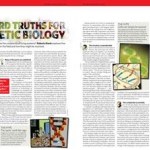News
tags: Tilikum, Tillikum, Tilly, Orcinus orca, Killer Whale, SeaWorld, Sea World, Orlando, Florida, whales, animals, news, behavior, streaming video
Are orcas too brainy for captive life? Should they all live only in "the wild"? This video is only the beginning of the debate .. what do you think?
tags: Tilikum, Tillikum, Tilly, Orcinus orca, Killer Whale, SeaWorld, Sea World, Orlando, Florida, whales, animals, news, behavior, streaming video
The latest word is that Tilikum will not be euthanized in retaliation for being associated with his third human death. Of course, if the SeaWorld officials did decide to euthanize him, this raises several problems, not the least of which are the publicity and the mechanics of carrying out this animal's demise.
This realist (me) has decided that SeaWorld avoided the "euthanization problem" in the case of Tilikum due to two reasons, and two…
Janet Stemwedel was a participant in a panel discussion on the ethics of animal research. She got her reward: she is now featured on the web page of a deranged terrorist for animal rights, complete with her home address and phone number. These thugs are people who threaten children and carry out violence against researchers, and deserve to be treated as terrorists, fitting the definition perfectly: they use fear and intimidation and violence to compel people to meet their irrational demands.
They are also ignorant, and don't even want to understand the purpose of basic research. This…
For most of us, the F in FOI stands for "freedom". It seems for Steve McIntyre, it stands for "form letter".
Via Eli Rabett we learn that the Freedom of Information requests (FOI) that are central to the only potentially damnng aspect of the CRU "swifthacking" incident have been released. They can be found here[PDF].
I have not looked at them yet, but Eli points out a very interesting one that begins thus (and we are quoting):
I hereby make a EIR/FOI request in respect to any confidentiality agreements)restricting transmission of CRUTEM data to non-academics involing the following countries…
Ok, maybe not. But just in case you were wondering why Americans watch the news constantly and know nothing, here's a pretty good example. Coming up next - how to write a completely generic blog post, by yours truly ;-).
TheTimes Online had a poll on one of their blogs last month, asking their readers if science in their free time is a 'guy-thing'? Who is reading their blog? So I thought I'd also write a poll asking something similar. The poll (below the jump) was written quickly, but with the intention of gathering as much data as possible from answers to that one question (If you check their poll and mine, you'll find the data I am collecting is somewhat different from theirs). I am going to let the poll run for one month and will summarize the answers at the end. I admit that I am as curious as you are…
Wisconsin lawmakers just passed a bill to name Lactobacillus lactis, the bacteria that turns milk into cheese, into its official state microbe! What microbe do you think best represents your state? I think Massachusetts' state microbe should be E. coli, not for the gross make you sick part of course, but because of the importance of the biotech industry to Massachusetts and the importance of the lowly E. coli to biotech. Add your vote for your state microbe in the comments!
tags: How To Report The News, journalism, television news, cultural observation, Charlie Brooker, satire, parody, humor, comedy, fucking hilarious, streaming video
This video parody brilliantly dissects the average television news report. It is not only hilarious, but it's unfortunately too true, and for this reason alone, should alert video news teams that their craft is in jeopardy because of its stunning inanity and predictability.
This should be required viewing for all journalism classes.
Riversimple, a small UK-based company, has designed a tiny, relatively cheap, and remarkably open-source hydrogen fuel cell car. The car will not be available for sale, but people will be able to lease it, with the lease agreement including maintenance, fuel, and the eventual recycling of the car. This unique business model allows for the company to manage sustainability for the life of the car. Check out the video below to see the car in action:
Hydrogen, of course is still hard to make, and there aren't many sustainable hydrogen production options. My lab is working on ways to make…
Today in my searches for the hot new trends in synthetic biology, I found a news article from Science Daily with an intriguing title: "Scientists Achieve First Rewire of Genetic Switches." Rewiring genetic switches sounds pretty neat, but this headline was intriguing to me first of all because it's kind of late to the party--in fact one of the first papers in modern synthetic biology back in 2000 was about engineered genetic switches: "Construction of a genetic toggle switch in Escherichia coli". When I looked more closely, the article wasn't about this kind of transcriptional switch though,…
tags: synthetic biology, molecular biology, genetics,Bacteria make Mexican Waves, A synchronized quorum of genetic clocks, bacteria, fluorescence,biological clock, NPG, peer-reviewed research, NATURE, 10.1038/nature08753, streaming video
By synchronizing our clocks, we can coordinate our activities with people around the world. Now, scientists have genetically engineered bacteria to synchronize their molecular timekeepers, creating the stunning fluorescent waves that you see in this video (this video shows new research published today in NATURE).
Read the original research here: http://dx.…
Five years ago today, we made the first post that would eventually make its way onto a blog called Cognitive Daily. We thought we were keeping notes for a book, but in reality we were helping build a network that represented a new way of sharing psychology with the world. Cognitive Daily wasn't the first psychology blog, but clearly it filled an important niche, because within a year, we were receiving over 30,000 page views a month. Now we often get over 100,000 page views a month, and we've totaled over four million. We reach many more people than would ever have bought our book, and we've…
Nature News has an excellent article about the hype, the challenges, and the potential of synthetic biology. The article quotes Martin Fussenegger, a leader in mammalian cell synthetic biology as saying "The field has had its hype phase, now it needs to deliver." In order to do so researchers will have to overcome five main challenges:
Many of the parts are undefined
The circuitry is unpredictable
The complexity is unwieldy
Many parts are incompatible
Variability crashes the system
The article is a great read, and includes interviews with many of the big names in the field, as well as…
It's football season in America: The NFL playoffs are about to start, and tonight, the elected / computer-ranked top college team will be determined. What better time than now to think about ... baseball! Baseball players, unlike most football players, must solve one of the most complicated perceptual puzzles in sports: how to predict the path of a moving target obeying the laws of physics, and move to intercept it.
The question of how a baseball player knows where to run in order to catch a fly ball has baffled psychologists for decades. (You might argue that a football receiver faces a…
Here's this week's list of notable posts from Psychology and Neuroscience at ResearchBlogging.org.
Is autism really surging? Michelle Dawson wonders whether the recent rise in autism rates can be traced to methodological differences in studies tracking autism rates.
We know many men are attracted to younger women, but what does it mean to look younger? Wayne Hooke looks at a recent study and concludes that looking younger may be a matter of looking less masculine.
Ever had a song that you just can't get out of your head -- an "earworm"? You'd think that psychologists would be all over…
An English professor at Indiana University, Don Belton, has been stabbed to death. The fact that he was gay is going to be an unfortunate issue here, since the accused killer is offering as an excuse the claim that Belton had assaulted him.
Of course, Belton was killed in his own home. With a ten-inch long military knife, which I'm sure is a common accessory carried by visitors to professor's homes. And he was stabbed several times in the front and five or six times in the back, suggesting that he'd assaulted his killer by way of a back flip, trying to batter him with his shoulder blades…his…
Television can have a huge influence on our lives. But the most important influences may be the ones we don't even notice. I discuss several fascinating studies about television in my latest column on Seedmagazine.com. Here's a snippet:
Travis Saunders, a PhD student at the University of Ottawa who studies the impact of sedentary lifestyles, questions whether a little exercise can make up for hours of inactivity. He refers to a study led by G.F. Dunton of the University of Southern California and published in October in the International Journal of Obesity. The researchers conducted a phone…
Television can have a huge influence on our lives. But the most important influences may be the ones we don't even notice. I discuss several fascinating studies about television in my latest column on Seedmagazine.com. Here's a snippet:
Travis Saunders, a PhD student at the University of Ottawa who studies the impact of sedentary lifestyles, questions whether a little exercise can make up for hours of inactivity. He refers to a study led by G.F. Dunton of the University of Southern California and published in October in the International Journal of Obesity. The researchers conducted a phone…
My column on Seedmagazine.com today explores citizen science: serious, peer-reviewed research that relies on the contributions of ordinary individuals. While the projects range from cosmology to zoology, there are plenty of psychology projects too:
Project Implicit is an ongoing series of experiments into the nature of human bias, hosted by Harvard University but incorporating research from around the world. The idea behind these studies is that people won't always overtly express their biases. For example, in most communities in the US it is socially unacceptable to be overtly racist. Even…
Peter Watts is a biologist and a science fiction author who combines the two beautifully — watch his fictional presentation on vampires to a pharmacology group to see what I mean. He's also a Canadian who was driving from the US to his home in Toronto when he was assaulted by American border guards, apparently provoked by his temerity in asking why they were rummaging through his luggage. You can read Watts' account of the episode, or the story on BoingBoing, and Making Light, but the bottom line is this: a writer was beaten, pepper-sprayed, arrested, and threatened with two years in jail for…


